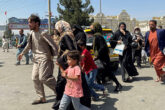
Does healing only depend on the faith of the one ministering, or is the faith of the afflicted one also important?
I don’t believe it is an either/or situation.
The faith of the minister is certainly important, but the heart condition of the afflicted one is also important. Signs and wonders follow the Word (Mark 16:20) and miracles are a result of the “hearing of faith” (Gal. 3:5).
To suggest that only the minister’s faith is necessary would mean we would have to question Jesus’ faith.
He prayed for a blind man twice (Mark 8:22-25).
“Then He came to Bethsaida; and they brought a blind man to Him, and begged Him to touch him. So He took the blind man by the hand and led him out of the town. And when He had spit on his eyes and put His hands on him, He asked him if he saw anything. And he looked up and said, “I see men like trees, walking.” Then He put His hands on his eyes again and made him look up. And he was restored and saw everyone clearly.”
Did Jesus struggle with His faith in that instance, or was the blind man dealing with some unbelief? The story in Mark 6 is clear regarding Jesus’ ministry in His own home town. It says, “He could not do any miracles there, except lay his hands on a few sick people and heal them. He was amazed at their lack of faith.” (Mark 6:5-6).
James is also clear: “But let him ask in faith, with no doubting, for he who doubts is like a wave of the sea driven and tossed by the wind. For let not that man suppose that he will receive anything from the Lord” (James 1:6-7).
Thus, the doubting and double minded are certainly hindered in receiving from God.
There are gifts of healings, miracles and faith and we see such an example in Acts 3:1-9. Peter instigated the healing but based on the other scriptures I’ve shared it seems apparent that there was no active unbelief in this fellow.
Acts 14:6-10 describes a lame man who heard Paul preach, and Paul “saw” that he had faith to be healed.
“But they found out about it and fled to the Lycaonian cities of Lystra and Derbe and to the surrounding country, where they continued to preach the gospel. In Lystra there sat a man who was lame. He had been that way from birth and had never walked. He listened to Paul as he was speaking. Paul looked directly at him, saw that he had faith to be healed and called out, “Stand up on your feet!” At that, the man jumped up and began to walk.”
In this case, it wasn’t Paul who forced a healing on someone with his own faith, but rather the “hearing” of the Word which gave birth to faith in the lame man, and Paul could see it.
This example follows what I have mentioned from Mark 16 and Galatians 3. Signs follow the Word. Faith comes by hearing. Even saying “such as I have I give you, in the Name of Jesus stand up and walk,” is proclaiming the Word and the Name. That is all it takes in some cases. Words went forth, and the Word is the atmosphere for faith to arise.
Salvation and healing work according to the same principles because they are a part of the same redemption. You can’t faith someone else into the Kingdom (salvation). You can pray for them, speak the Word to them, love them and encourage them, but you can’t save them. They must believe and receive the gift of righteousness. So it is with healing. Some are ready to receive healing at the drop of a hat and others are not.
The faith of the minister can certainly create the environment for the sick one to receive, but there has to be an open, receptive heart on the part of the one who is afflicted.
The author is a senior Instructor at Charis Bible College, Colorado.

